
Table of Contents
- Dog Tooth Extraction Cost: Why Do Dogs Need Tooth Extraction?
- Factors That Impact the Cost of Dog Tooth Extraction
- Dog Tooth Extraction Cost
- Does Pet Insurance Cover the Cost of Tooth Extraction?
- How to Prevent the Risk of Dogs Needing Tooth Extraction
- Frequently Asked Questions
- Dog Tooth Extraction Cost: Summary
If you're a long-time dog owner, you know their dental health is as important as their physical health.
If your dog needs tooth extraction surgery, you might want to know the latest dog tooth extraction cost.
Unfortunately, dogs are prone to dental issues just like humans, and tooth extraction is a common procedure that some dogs may need to undergo at some point in their lives.
While the thought of your furry friend undergoing dental surgery may be daunting, it's important to prioritize their health and well-being.
Many dog owners have one question: how much does dog tooth extraction cost?
In this blog, we'll tackle the factors that impact the cost of dog tooth extraction and provide some general cost estimates to help you prepare.
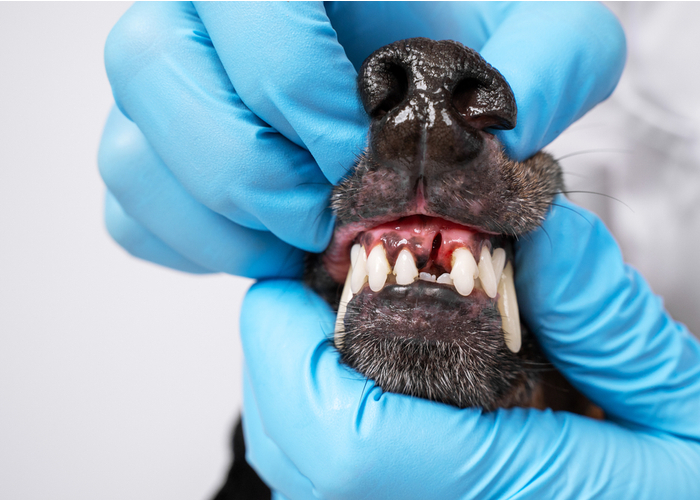
Dog Tooth Extraction Cost: Why Do Dogs Need Tooth Extraction?
Before we get into its cost, let's first figure out why dogs need a tooth extraction.
There are many reasons why dogs need a tooth extracted. Whatever it is, it's important to consult with a veterinarian to determine the cause of the problem and the best course of treatment.
Sometimes, the veterinarian may recommend other dental treatments or procedures to help preserve the dog's teeth and prevent future problems.
Below are common causes of teeth extraction in dogs.
Tooth decay
Just like humans, dogs can develop cavities and tooth decay, which can cause pain, infection, and, eventually, tooth loss.
If left untreated, tooth decay can spread to other teeth and cause more serious health problems.
Gum disease
Gum disease is a common problem in dogs, especially as they age.
Left untreated, it can lead to periodontitis, a serious infection that can cause tooth loss and even affect the dog's overall health.
Trauma
Dogs may experience trauma to their teeth due to accidents or injuries, which can cause a tooth to break or become loose.
The tooth may need to be extracted to prevent infection and pain.
Overcrowding
Some dogs may have too many teeth or teeth too large for their mouth, which can cause overcrowding and misalignment.
The teeth may need to be extracted in severe cases to prevent dental problems and discomfort.
Baby Teeth
Retained baby teeth are one of the most common reasons why tooth extraction is needed for puppies.
As puppies grow, their baby teeth should fall out. However, sometimes things don't go as planned.
These baby teeth must be extracted for their growing permanent teeth. If not, it can cause problems with the alignment and have long-term negative effects on the dog's bite.
Periodontal Disease
Periodontal disease is a common condition in dogs that affects their teeth, gums, and supporting structures.
Left untreated can lead to tooth loss and other serious health problems.
Tooth extraction may be necessary to manage periodontal disease. The infection can spread to the roots and surrounding bone, making the tooth unstable and painful.
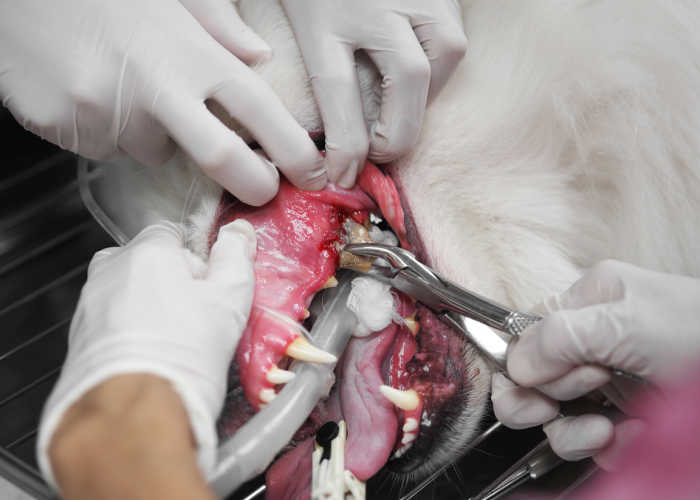
Factors That Impact the Cost of Dog Tooth Extraction
There are a lot of factors that affect the price of dental surgeries. It will depend on the place, your dog, the medicine, and the procedure needed.
Below is a quick list of the factors that can impact the cost of dog tooth extraction.
Type of extraction
The first factor is the type of extraction that will be performed. This usually depends on the dental problem your dog is experiencing.
Simple extractions, which involve removing teeth that are fully visible and easy to access, are generally less expensive than more complex extractions, such as surgical extractions, which include removing teeth that are broken or impacted.
Size of the Dog
The size of the dog can also impact the cost of tooth extraction. The larger the teeth, the more it'll cost you.
Smaller dogs typically have smaller teeth, which are easier to extract, and, therefore, may cost less than extractions in larger dogs with larger teeth.
Location of the Veterinarian
The cost of tooth extraction also depends on the area. If you live in a small town, the price will probably cost less.
But if your vet is located in areas with a higher cost of living, such as large cities, veterinary care may be more expensive overall.
Dental Problem
Suppose the dental problem is more severe, such as advanced periodontal disease or a tooth abscess.
In that case, the cost of tooth extraction may be higher due to the need for additional procedures, such as bone grafting or treatment of the infection.
Anesthesia
The cost of tooth extraction may also include the cost of anesthesia and monitoring during the procedure. In most cases, general anesthesia will be used.
Anesthesia is commonly used during tooth extraction procedures to ensure the dog remains still and comfortable.
The kind of anesthesia used will depend on the age and overall health of the dog, as well as the complexity of the extraction.
Care
After the tooth extraction, the dog may require follow-up care, such as pain medication or antibiotics, which can also add to the overall cost of the procedure.
It's important to discuss the estimated cost of the procedure with your veterinarian before proceeding with any dental work to ensure that you are prepared for the potential expenses.
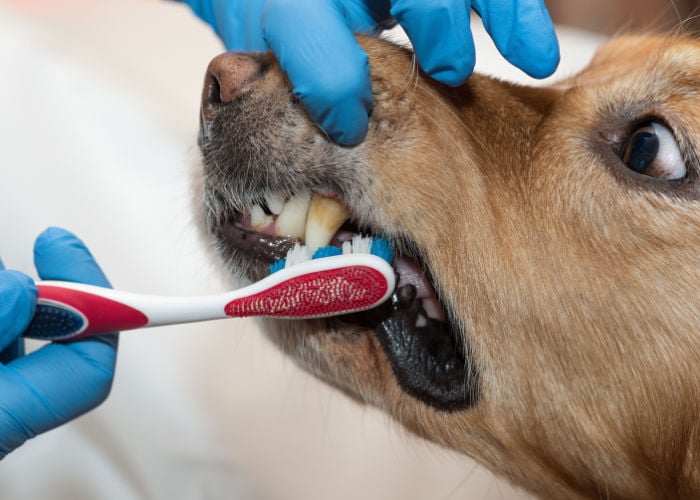
Dog Tooth Extraction Cost
The cost of a dog's tooth extraction will depend on different factors, such as the location, the veterinary clinic, the severity of the dental problem, and the size and breed of the dog.
But for simple extractions, it can cost maybe between $10 to $25 for each tooth.
However, the complexity of the extraction procedure can drive up the cost. Elevated extractions can cost $25 to $100 per tooth.
As we've discussed above, it will also vary on the vet. Some vets charge a flat fee no matter how many teeth must be removed.
For instance, vets can charge a flat fee of $100 for three or more teeth. Unfortunately, if you have a tight budget, it can also range from $500 to $800.
Usually, an impacted tooth removal could run $800 to $4,000.
Additional Costs to Expect
Additional costs remain to anticipate for removing your dog's teeth. For instance, anesthesia will cost around $90 to $1,000, depending on the dog's size.
Some vets will also advise teeth cleaning, which ranges from around $300 to $700.
Another thing that you should be prepared for is a root canal. Now that will be pricey as it usually ranges around $1,000 to $3,000.
Lastly, an oral evaluation is about $50 to $200.
Does Pet Insurance Cover the Cost of Tooth Extraction?
Pet insurance policies can vary depending on the provider and the specific policy.
Fortunately, many pet insurance plans cover the cost of tooth extraction, as dental problems are a common issue for pets.
Before purchasing a pet insurance policy, review the plan's details carefully to determine what is covered and what is not.
Some programs may limit coverage for dental procedures or require a waiting period before coverage begins.
Some pet insurance plans only cover tooth extractions considered medically necessary. For instance, in cases of severe decay or infection instead of cosmetic reasons.
Review the policy's coverage details thoroughly, and don't be shy to speak with a representative from the insurance company if you have any questions about coverage for dental procedures.
How to Prevent the Risk of Dogs Needing Tooth Extraction
Now that you've seen the costs of tooth extraction in dogs, you might be wondering how you will be able to prevent these expenses.
The best thing you can do is to take care of your dog's dental health. Here are some tips to keep it healthy and clean.
- Regular Brushing – Brushing your dog's teeth regularly is the most effective way to prevent dental problems. Daily brushing is also recommended to avoid tartar buildup and remove bacteria lurking inside their mouths.
- Healthy Diet – Feeding your dog a healthy diet that contains high-quality dog food can help remove plaque and tartar from their teeth.
- Regular Check-ups – Regular inspection can help identify dental issues early on and prevent them from worsening. Your vet can also advise you on the best dental care practices for your dog's needs.
- Dental Treatments – Professional dental cleanings, polishing, and fluoride treatments can also help maintain your dog's teeth dental health and prevent the risk of tooth extraction.
- Chew Toys – Providing your dog with safe and appropriate dental chew toys can help keep their teeth healthy and reduce the risk of dental problems.
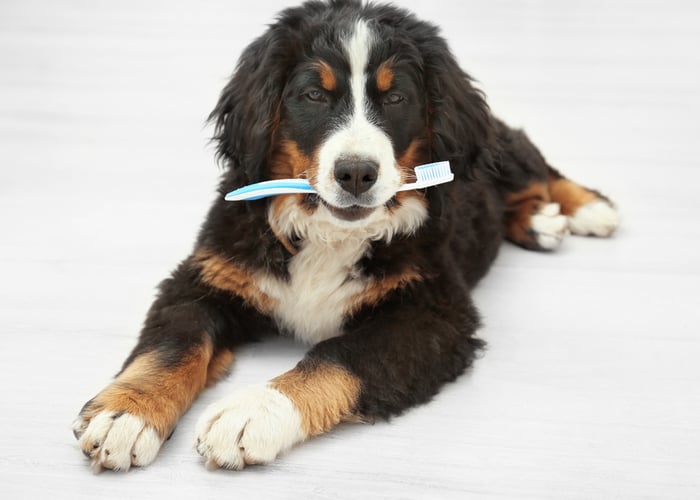
Frequently Asked Questions
Why are dog teeth extractions so expensive?
Dog tooth extractions are expensive because it takes longer to extract them due to the root of the teeth.
It will vary on the length of the root, and some teeth have more than one root, making it more costly than a single-root tooth.
Do dogs' teeth grow back after extraction?
If a baby tooth is lost, an adult tooth will replace it. And just like humans, if an adult tooth is damaged or lost, it will not regrow.
Other animal species, like sharks, however, can regrow damaged teeth.
Do dogs feel pain from bad teeth?
Yes, dental problems can also be painful for dogs.
For instance, if a dog is suffering from gingivitis (inflammation of the gums), it can be uncomfortable for them.
Other dental issues, such as fractured teeth, tooth root abscesses, and oral tumors, are painful for dogs.
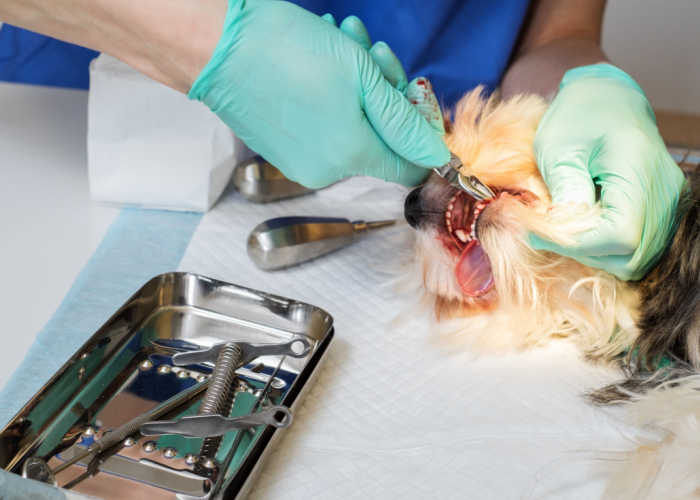
Dog Tooth Extraction Cost: Summary
The dog tooth extraction cost will depend on different factors. It will depend on the size of the dog's tooth, the type of extraction needed, the anesthesia, the location of the vet, and more.
Dog tooth extractions can cost anywhere from $10 to $3,000.
However, this cost can increase if the tooth is infected or additional procedures, such as x-rays, antibiotics, or pain medication, are necessary.
That's why keeping your dog's dental health intact is important. You can also avoid feeding your dog hard treats that can injure a tooth.
Regular brushing is recommended to prevent these damages.












